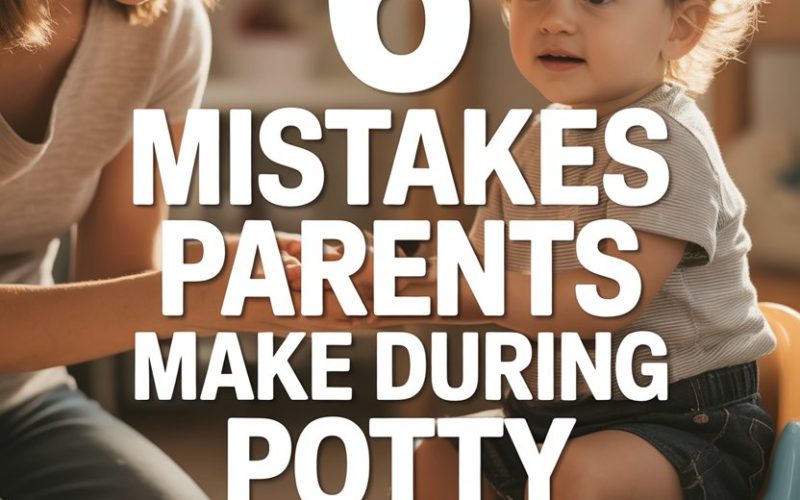Potty training: that magical and mysterious time when your tot’s bottom rules the entire household.
The promise of dry pants and triumphant underpants dances is almost enough to make you weep with joy—or frustration, depending on the day.
If you’re feeling like you’ve hit a puddle-filled wall, you’re not alone.
Let’s talk about the six most common potty training faceplants and how to flip them into success stories.
1. Pushing Too Hard, Too Soon
Every parent’s heard the tale of that neighbour’s toddler who practically trained themselves at 18 months. Here’s a secret: every child is different, and not all of them are ready to bid nappies goodbye at the same age.
Pressuring a child before they’re developmentally ready usually results in power struggles and tears—sometimes from you.
Experts at NHS recommend watching for signs that your child is ready, such as staying dry for longer stretches, showing interest in what happens in the bathroom, and being able to follow simple instructions.
If your child is hiding behind the sofa to poop but running screaming at the sight of the potty, it might be worth hitting pause.
Patience is your best mate here. Wait for those signs and you’ll both have a smoother, less messy ride.
2. Making Potty Training a Power Struggle
Nothing gets a toddler’s back up faster than turning potty training into a battle of wills.
If you find yourself saying things like, “You will sit there until something comes out!”—take a deep breath and remember who you’re dealing with.
Children crave control over their bodies. Forcing the issue, nagging, or shaming can lead to resistance, accidents, and sometimes even full-on toilet refusal.
That’s not just inconvenient—it can create negative associations that last well beyond the training phase.
According to child psychologists, offering low-pressure encouragement and allowing your child to feel in charge of the process can actually speed things along.
Encourage, don’t command. Praise the effort, not just the result. And maybe invest in a few extra pairs of undies—just in case.
3. Expecting Instant Success (and Not Being Ready for Relapses)
Potty training isn’t a straight line; it’s more like a zigzag drawn by a toddler on a sugar rush.
Expecting your child to go from nappies to totally dry overnight is a recipe for disappointment (and mopping). Even after children “get it,” accidents are bound to happen—like at Granny’s house or right after you’ve steam-cleaned the carpet.
Experts like the American Academy of Pediatrics remind us that setbacks are a normal part of the process.
Stress, illness, big changes (hello, new baby), or just a case of the “can’t-be-bothereds” can cause temporary regressions.
Stay calm. Swap frustration for compassion.
Chances are, your child already feels embarrassed or upset about the accident. Keep extra clothes handy and reassure them that learning new things takes time.
4. Skipping the Prep Work (For Both of You)
If your child’s only experience with a toilet is watching you dash in and out like you’re racing the clock, you might be missing a trick.
Introducing the potty as a normal, positive part of daily life before you start training sets the stage for success.
Let your child explore the potty—maybe even let their favourite stuffed animal “use” it first.
Read a few fun books together (there are some gems like Potty by Leslie Patricelli that make the whole process less intimidating). Point out when you’re heading to the loo yourself—yes, privacy goes out the window for the cause.
And don’t forget yourself! Stock up on cleaning supplies, patience, and snacks for those long bathroom stake-outs.
Knowing what’s ahead makes the journey less bumpy for both of you.
5. Not Being Consistent (and Sending Mixed Signals)
One day it’s underpants, the next day it’s back to nappies, and then you’re bribing with chocolate buttons. Confused? So is your child.
Consistency gives your toddler a clear message: this is the new routine. Pick a method and stick to it for at least a week or two before deciding if it works—or doesn’t.
If you start potty training on a Monday and switch gears by Thursday, your child’s going to be as baffled as you are.
This doesn’t mean you can never use a nappy again—life happens, and that five-hour car trip to Grandma’s is not the time to test your luck.
Just try to keep the rules the same as much as possible, and explain any changes. A steady approach helps your child feel secure and less likely to dig in their heels.
6. Punishing Accidents (Forgetting That Mistakes Are Part of Learning)
Accidents happen. Sometimes spectacularly. The urge to scold or punish can sneak up, especially after the fourth puddle of the afternoon.
Yet, punishment usually backfires, making your little one anxious about toileting and possibly causing even more mishaps.
Specialists at Zero to Three recommend calmly cleaning up and reassuring your child.
Instead of “Why did you do that?” try “Oops, accidents happen. Let’s get you cleaned up.” This keeps the whole process positive and supports your child’s growing confidence.
And in those moments when it feels like you’re running a laundrette out of your hall cupboard, remember: this is a skill, not a test. Everyone learns at their own pace—even the parents.
When You’re Ready to Burn the Potty
Potty training can feel endless, especially when you’re juggling work, life, and a small human who insists the toilet is haunted.
Progress may be slow, setbacks are guaranteed, and your child’s favourite place to have an accident will always be the one carpet you didn’t roll up.
But believe it or not, every child gets there in the end. Stay patient, keep your sense of humour handy, and remember you’re not alone in this slightly soggy adventure.
One day—maybe sooner than you think—you’ll look back and laugh. Or at least dry the last pair of undies and celebrate with a big cuppa.




